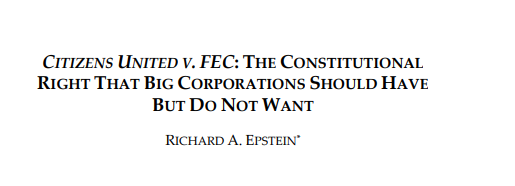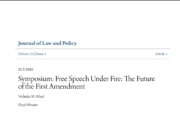In an age of much sharp political division and incipient populism, it is easy to raise emotional flags by asking the question of whether corporations should have some of the same rights as individuals. In this article, Richard A. Epstein examines the many questions that swirl around the Citizens United decision in order to expose the fundamental errors of its vocal critics. Epstein explores the justifications for the Court’s decision in Citizens United from both constitutional and pragmatic perspectives. He concludes that the Citizens United majority has the better of the issue insofar as it seeks to fold issues of corporate speech into the general fabric of First Amendment law. From a pragmatic point of view, he concludes most corporations have little desire to exercise the constitutional rights that they possess and this for the simplest of reasons: corporations are far better off concentrating their energies on specific issues of concern to them, and they become sitting ducks to the extent they choose to enter any broader political arena. The author notes that, over a broad range of issues, business success depends on keeping a low profile in general elections.














